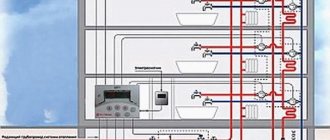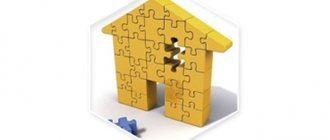Question in light of legislation
You won’t be able to think about anything at all—not a single room will be provided free of charge. So, at a minimum, you will have to pay for the apartment and keep the common property in order (Article 678 of the Civil Code of the Russian Federation).
Responsibilities of a residential tenant
The tenant is obliged to use the residential premises only for living, ensure the safety of the residential premises and maintain it in proper condition. The tenant does not have the right to carry out reconstruction and reconstruction of residential premises without the consent of the landlord. The tenant is obliged to pay rent for the premises on time. Unless otherwise specified in the contract, the tenant is obliged to make utility payments independently.
Do I have to pay for major repairs if the apartment is not privatized? According to the current law, whoever owns the home pays for it (Article 158; 169 of the Housing Code of the Russian Federation). Should tenants pay for major repairs?
If the apartment is not the property of a person, that is, he either rents it or lives under a social tenancy agreement, the payment for major repairs of a municipal apartment falls either on the municipality or on the landlord. If such receipts arrive at the address where a commercial tenant lives, they must be handed over to the owner of the premises.
Moreover, according to current standards, contributions must be paid for everything - both inhabited and non-residential premises of the building included in the overhaul program.
Who should change the wiring in a municipal apartment?
After this period, these requirements are subject to satisfaction in one of the following cases: - discovery of a “significant defect” in the goods; - violation of the deadlines established by this Law for eliminating product defects; - inability to use the product during each year of the warranty period for a total of more than thirty days due to repeated elimination of its various deficiencies.
Criminal Code of the Russian Federation Article 238. Production, storage, transportation or sale of goods and products, performance of work or provision of services that do not meet safety requirements (as amended by Federal Law dated 07/09/1999 N 157-FZ) (see text in the previous edition)
Criminal Code of the Russian Federation Article 238. Production, storage, transportation or sale of goods and products, performance of work or provision of services that do not meet safety requirements (as amended by Federal Law dated 07/09/1999 N 157-FZ) (see text in the previous edition)
According to paragraph 6 of the Rules for the Use of Residential Premises, approved by Decree of the Government of the Russian Federation of January 21, 2006 No. 25, the use of residential premises must be carried out taking into account the rights and legitimate interests of citizens and neighbors living in the residential premises, fire safety requirements, sanitary and hygienic, environmental and other legal requirements.
By virtue of clause 4 of Part 30 of the Housing Code of the Russian Federation, the owner of a residential premises is obliged to maintain this premises in proper condition, preventing mismanagement of it, to comply with the rights and legitimate interests of neighbors, the rules for the use of residential premises, as well as the rules for maintaining the common property of premises owners in an apartment building home.
Read other lawyers' answers:
- What to do with the Share of a Withdrawn Participant
- Where to Get a Certificate of Ownership of an Apartment
- Dug up the Road to Complain
- How long can you travel with an expired passport?
- Document permitting to engage in any activity
Dear colleagues, I wish each of us to hold high the title of lawyer, unswervingly adhering to the principles of impartiality and objectivity!
If the apartment is municipal, then who pays for major repairs?
So who pays for major repairs in a municipal apartment? The one who owns it is the municipality . Does the tenant have to pay for major repairs? This does not concern him (Article 154 of the LC). The fee required from residents of state “squares” includes payment for:
- for hiring;
- maintenance and repair of the house (we are talking about current repairs);
- Housing and communal services (gas, sewerage, hot and cold water, garbage removal. Important: contrary to the established opinion of some not very literate citizens, the category of housing and communal services does not include major repairs! This is a separate item that can only be applied to the owners of the premises. True, the problem is that in practice the difference between current and major repairs may turn out to be purely arbitrary).
Does the tenant have to pay for major repairs?
Should a non-homeowner pay for major repairs? No, you shouldn't .
A person living in an apartment for commercial rent is obliged to pay the amount specified in the contract and housing and communal services. If such receipts arrive, they need to be sent to the owner of the apartment. If you occupy space under a social tenancy agreement, you can simply ignore receipts for major repairs. But it would be better if you contact the Management Company with a request to resolve the misunderstanding.
Payment for major repairs if the apartment is not privatized
Do I need to pay for major repairs if the apartment has not been privatized? Such repairs are important, as work is being carried out to improve the living conditions of citizens in apartment buildings.
The apartment is not privatized. Do I need to pay for maintenance and repairs?
Eduard Viktorovich Ponomarev This lawyer is from Moscow And now attention, the correct answer. open the original source - housing complex rf.st.154 “1.
payment for residential premises and utilities for the tenant of residential premises occupied under a social tenancy agreement or a rental agreement for residential premises of the state or municipal housing stock includes: 1) payment for the use of residential premises (rental fee); 2) payment for the maintenance and repair of residential premises, which includes payment for services and work on managing an apartment building, maintenance and routine repairs of common property in an apartment building. major repairs of common property in an apartment building are carried out at the expense of the owner of the housing stock; 3) payment for utilities.
The nuances of paying for the overhaul of an apartment if it is not privatized
Frequently Asked Questions Citizens are interested in the procedure for financing the costs of major repairs, the tenant's course of action if receipts for payment for such repairs continue to appear regularly in the mailbox, etc. Does the tenant pay? Is the tenant required to pay for major repairs? No. It is necessary to contact the real owner of the residential premises or contact the management company.
If the apartment is not privatized, do I need to pay for major repairs?
What is included? The structure of fees for housing and communal services is established by Article 154 of the Housing Code of the Russian Federation. The list of payments includes:
- payment for the management of an apartment building and the maintenance of common property
- payment of expenses for electricity, cold and hot water supply, sanitation - to meet collective needs
- Housing and communal services payments for individual consumption (in a household) - for heating, gas, hot and cold water, sewerage, solid waste removal.
Utility payments are made monthly, no later than the 10th day of each month, unless a different deadline was established at the general meeting of homeowners in the apartment building. Payment transactions are carried out on the basis of receipts and other documents received by residents.
Most housing and communal services are paid for per year using individual metering devices. taking into account tariffs. established by special commissions in the regions.
I have not privatized the apartment, should I pay for repairs and maintenance of the house?
Source: https://aquachus.ru/oplata-za-kapremont-esli-kvartira-ne-privatizirovana/
How is the fee calculated?
The amount indicated in receipts sent to addresses may vary. The amount depends on many nuances , the main ones being the age of the house and the presence or absence of an elevator . It is clear that the renovation of Stalin-era buildings and the construction of elevator structures in them will cost much more than the nine-story buildings built at the end of the previous century.
The work itself will be carried out in a regular order. Where you place in line depends on the following factors:
- when the house was put into operation;
- how much money has already been collected;
- date of last overhaul.
The transferred contribution should not be less than the denomination established by the state (in the Moscow region it is eight rubles and thirty kopecks), but it can be increased by decision of the meeting of apartment owners. The calculation is carried out in rubles according to the principle: the cost per square meter multiplied by the total area of the home.
Money can be transferred in two ways : to a dedicated special account for a specific home, or to the account of a regional operator.
If the owners choose the first option, then on the one hand this is preferable (because the movement of money is completely in their sight), on the other hand, the owners are responsible for literally everything.
And this includes the choice of the bank and the account owner, and the determination of the size and nature of the work, their acceptance, and the preparation of estimates. That is, quite a lot. And you will have to report quarterly. Residents need to decide how contributions will be transferred within two months after the adoption of the regional program. If they do not reach a consensus during this time, the second option will be considered by default , that is, the regional operator.
Should residents of non-privatized apartments have to pay for major repairs? In other words, if you have not privatized the premises, then you do not have to pay for major repairs. If you are renting, inform the landlord about the receipts, and if the tenant is on social rent, contact the management organization.
Didn't find the answer to your question? Find out how to solve exactly your problem - call right now:
Housing Payment Law
It won’t work to pay for anything at all; they don’t provide citizens with a single apartment for free. Therefore, you will have to pay for the maintenance and current repairs of common property, as stated in Article 678 of the Civil Code of the Russian Federation.
It says that tenants must use rented municipal housing only for living, while maintaining it in proper condition . They cannot organize various redevelopments without the consent of the landlord. They are also obliged to pay for the rental of residential premises within the specified time frame. Unless otherwise specified in the contract, they must pay the fee themselves.
At the same time, to the question whether the tenant is obliged to pay for major repairs if the apartment is owned, the answer is yes. According to Articles 158 and 169 of the Housing Code, who owns the premises, that is, the tenant, pays for the work. Then the question arises: in the case when the apartment is not privatized, who will pay for major repairs?
Tenants do not make contributions towards capital repairs of public premises, because this is the responsibility of the owners, represented by the municipality or the landlord.
Copyright holders pay for major repairs, and when receipts are received at the tenants’ address, they must be redirected to the apartment owner, at whose expense such work is paid.
At the same time, you need to pay for premises that are subject to repair - both residential and public, and uninhabited, they are included in the program.
At whose expense are they obliged to change?
Batteries
Only those radiators that serve several apartments at once are replaced at the expense of the management company or HOA . Then they are recognized as common property. Those batteries that are in the apartment, naturally, only heat one home.
Therefore, the costs and responsibility for replacing them lie with the homeowner. Sometimes several apartments unite and enter into an agreement to collectively replace radiators. The costs are then shared among everyone.
Risers
The management company must replace the risers, but at the expense of the homeowners (Article 153 of the Housing Code of the Russian Federation), since they belong to common property. The work will be either routine or major repairs.
If the management company refuses to carry out the work, then it is necessary to seek justice in court. Fortunately, positive decisions have already been made in practice, such as, for example, the ruling of the Constitutional Court of the Russian Federation dated October 19, 2010. No. 1334-0-0.
Important point : the receipt for the “utility” includes the line: repair and maintenance of the premises. It is she who is responsible for the costs of replacing the risers. Thus, collecting additional money for repairs is illegal.
Pipes
Again, the whole question is who owns these pipes . For example, risers are common property. Accordingly, pipes related to common property are repaired by the management company or the HOA (again, Article 151 of the Housing Code of the Russian Federation).
Everything that comes after the first valve on the riser is the personal property of the owner of the privatized housing. Consequently, he personally changes the pipes himself.
It is important to remember about major renovations. If pipe repairs must be carried out according to this program, then all work is performed by the management company.
Electric meters
Article 543 of the Civil Code of the Russian Federation states that the management company must monitor the condition of meters located :
- on staircase landings;
- in premises that are not privatized.
Consequently, the owners must monitor the condition of the meters inside the apartment. But who should change them?
Owners are required to pay:
- repair and maintenance;
- installation and dismantling of the meter;
- checking and calibration.
The electricity meters in the apartment must be changed by the owners themselves, and on the landing - by the management company.
Payment for major repairs
So, who pays for future major repairs if the apartment is municipal? This must be done by the owner of the non-privatized apartment, that is, the municipality. The tenant is not obliged to do this, since he is not the owner and, according to Article 154 of the Housing Code, does not bear any obligations for such work. The payment for housing and communal services includes only the following items:
- for rent of municipal premises;
- for maintenance and ongoing repair work inside the apartment;
- for gas, water, garbage removal and other utilities.
Therefore, paying for major repairs in no way falls on the shoulders of employers , although many are sure that it is necessary to pay. No, only owners of residential premises need to make contributions to the fund for the work being carried out. But in some cases, the differences between current and major repairs are quite illusory, and not only owners, but also tenants have to pay for such work.
Features of renovation of municipal apartments
The landlord is the owner of municipal housing, which, in our case, provides an apartment to the tenant under a social contract. A tenant can live in an apartment with his family as long as he likes, but cannot pass it on by inheritance, donate it or rent it out, remodel it, or perform many other operations. The tenant must pay housing and utility costs, maintain the apartment in proper sanitary and hygienic condition, otherwise the owner of the property has the right to demand that the premises be restored to their original condition, collect a fine, compensate for damage and demand the introduction of other sanctions. According to the contract, the landlord must carry out major repairs, and the tenant must carry out routine repairs, as follows from paragraph 2 of Article 65 of the RF Housing Code.
What is included in major repairs and current
The first step is to determine which works should be included in the list of major repairs and which should be included in routine repairs in order to understand what the landlord must pay by law. And in what cases can you demand compensation for damage if it seems to you that he does not fulfill his requirements.
Major repairs were not included in a specific list in the standard social housing rental agreement, but in Appendix No. 8 of the rules and regulations for the technical operation of the housing stock dated September 27, 2003, approved by the Resolution of the State Construction Committee of the Russian Federation, capital works include:
- Replacement of utility networks inside the apartment itself;
- Facade repair;
- Roof repair;
- Insulation of buildings and so on.
In general, major repairs include things related to common property, welfare and complete replacement of communications.
As for the current repairs, which fall on the shoulders of the employer during social hiring, this list of works is described in the standard rental agreement approved by Resolution No. 315 of the Government of the Russian Federation on May 21, 2003, which you should have in your hands, or you can read its contents on the Internet . Current repairs include:
- Plaster work inside the apartment;
- Painting work inside the apartment;
- Tiling work inside the apartment;
- Painting floors, window sills, doors, radiators;
- Replacement of door and window devices;
- Repair of engineering equipment: switches, sockets, plumbing fixtures and so on.
All this is very logical and is included in the list of cosmetic repair or economy class repair services that our company provides.
Who is responsible for what
There is no exact list of works in one connection or another, but this stems from the logic of things based on the responsibilities of the parties. For example, if the electrical appliances in the house were disabled due to a malfunction of the general house electrical network, then the municipal authorities are obliged to repair the electrical appliances in the apartment at their own expense or compensate for the damage, the same applies to the tenant, if the tenant violated the rules of operation of the premises and conditions contract, which entailed the need for repairs, then the owner has the right to demand compensation for damage from the tenant, or the tenant must carry out the repairs himself at his own expense.
The employer has rights. If the apartment or house needs major repairs, the tenant has the right to contact the maintenance company, the owner, or force them to fulfill their duties through the court. The basis for a positive court decision in this case will be the conclusion of an independent technical expert, the contract and the housing code of the Russian Federation, in the mentioned chapters. If the court decision is on the side of the tenant, then the tenant has the right to demand from the owner:
- Reduce fees for municipal apartments;
- Reimburse the costs of eliminating housing defects.
That is, if as a result of the inaction of the landlord and owner of the property, living conditions have worsened, then you have the right to demand compensation for losses in one form or another. However, read the terms of the contract so that the opposite situation does not happen.
How to save on renovating a municipal apartment
In this case, it will be possible to save only if the owner undertakes major repairs himself, and current repairs are carried out regularly and correctly, otherwise neither party will win. After all, it can hardly be called economical to deteriorate the living conditions of residents at the expense of the state, as many believe and live in unbearable conditions all their lives, ruining the lives of others and themselves. This path is not for us.
We offer regular maintenance of your rooms. It is necessary to carry out timely repairs of faulty engineering equipment, seasonal repairs, keep the house clean and use the apartment for its intended purpose. Thanks to this, the living conditions in the apartment and house will be excellent, and the owner will not have any complaints. And you will have the right to demand that he fulfill his duties if your efforts suddenly go in vain. Sometimes we are stopped by minor financial problems halfway through the renovation process. To prevent this from happening, we offer repair services in installments. Pay for part of the repairs, and pay the rest in installments as the work progresses.
If the owner refuses to fulfill his obligations to you, and because of his negligence, your current and cosmetic repairs are lost, then you will have the right to turn to him and substantiate your claims. The roof leaked, the riser collapsed, gas pipeline faults, bugs, rats, and so on. All these are problems for the owner and the service company, who will pay for repairs if it worsens your conditions. In this case, you should contact a lawyer and involve an independent specialist who will conduct a technical inspection of the apartment and house to submit the report to the court. And then your current and cosmetic repairs will become a headache for the owner if the apartment is municipal.
Responsibilities of the employer
The main responsibilities of the tenant are payment for received utilities on time and maintenance of the premises. However, he does not pay property taxes.
In addition, the tenant is obliged to use the rented premises only for its intended purpose, and he must keep it in good condition. It follows from this that he is obliged to carry out routine repairs on time, to prevent dilapidation and damage to the living space. Similar works include:
- painting the ceiling, doors and windows;
- wallpapering walls;
- painting batteries and pipes.
If the doors and windows become unusable, the tenant is obliged to replace them with new and serviceable ones. Also, if necessary, it is necessary to repair electrical, gas wiring and other communications. To do this, you need to call professional specialists. Redevelopment work on the premises without the consent of the landlord is prohibited. But work on common property falls on the owner, who must pay for it, that is, this is the responsibility of the public service.
If bills are received to pay for major repairs for a tenant, they must be sent to the owner of the premises. When such receipts are received by social rented tenants, there is no need to pay a fee, but it is worth contacting the Management Company, which will sort out such a mistake, because paying for major repairs is the responsibility of only the owners.
Main responsibilities
Housing office
The responsibilities of the management company are divided into two types:
- Operation and repair work.
- Organizational services.
The first type includes responsibilities:
- Carry out routine repairs.
- Eliminate accidents inside the house.
- Ensure the proper condition of utility networks that are located inside the building and supply resources.
- Observe fire safety measures.
- Maintain and improve the local area.
- Prepare the apartment building for the winter period.
- Ensure the introduction of the meter and its subsequent operation if it is located in a common building or municipal premises.
- Provide special places for collecting mercury-containing lamps.
- Collect and dispose of household waste.
- Carry out energy saving measures.
The second type of responsibilities includes:
- Search and punishment of thieves of resources (gas, light, water).
- Carry out registration records of citizens living in the apartment building.
- Ensure the integrity and safety of home documentation.
- Organize a periodic meeting of all homeowners to report on the work done.
- Inform apartment owners about changes in utility tariffs.
- Provide public services of adequate quality.
Owner
The property owner has the following responsibilities:
- Maintain the apartment in proper condition and prevent mismanagement of it.
- Bear the burden of responsibilities for maintaining the living space.
- Respect the interests and legal rights of your neighbors.
- If an accident is detected, immediately report it to employees of the management company.
- Use meters in the apartment.
- If you discover a malfunction of the metering device (including the absence of a seal), contact the management company.
- Pay utility bills on time and in full.
- Allow utility workers into the apartment to check communications in the housing.
- Monitor the timing of meter verification and report when it is completed.
Calculation of contributions
Their sizes vary from place to place. The amount is directly dependent on the deterioration of the house and the presence of an elevator system. From this it is clear that in dilapidated Khrushchev and Stalin buildings, major repairs will be more expensive than in Brezhnev panel houses.
All work is carried out only within the established time frame, which depends on many factors:
- age of the building;
- money collected by the owners;
- date of the last capital work carried out.
The payment should not be less than that established by municipal authorities, but it may be more when it is decided by the homeowners. Such a fee is calculated simply - square meters are multiplied by the price per 1 square meter.
Funds are transferred in two ways:
- To the account of a separate residential building opened for this purpose.
- To the account of the regional operator.
In the first case, the movement of funds can be tracked, but this is also a great personal responsibility that the homeowners bear. That is, choosing a financial organization, appointing an account owner, calculating planned work, etc. In this case, it is necessary to report to regulatory authorities every three months.
But in any case, residents of a state apartment are not required to pay for major repairs in a municipal apartment if it is not privatized. If you receive receipts with the corresponding column, then you should go to the Management Company and resolve such a misunderstanding regarding payments. You can also simply ignore and not pay - this will not violate the current legislation.
The official will fork out
There is still a lot of old and problematic housing in the country. And it’s no secret that apartments in such “elderly” buildings are mainly inhabited by poor, old and sick citizens. Residents of a dilapidated building, as a rule, are no longer able to take out a mortgage and purchase something new. According to experts, it is in such houses that the majority of municipal housing is located, that is, those whose owners are local authorities. And citizens live in them under social tenancy agreements. Our “repair” court case concerns specifically old municipal housing.
Who is doing the replacement?
In order to understand the situation, you will first need to delve into this problem in more detail.
First, about the location of the meters.
There are two options here:
- In many cases, this device is located outside the home, usually in the stairwell. To access it you do not need to enter the apartment.
- There is another option. Some apartment buildings are built in such a way that the electric meter is located inside the dwelling. In order to access it, you need to ring the doorbell and go into the apartment.
Other differences are also possible:
- We can talk about an apartment that is privately owned. This could be, for example, a privatized apartment or housing that was purchased on the basis of a purchase and sale agreement.
- Another very common option is when the property is municipally owned. In this case, residents use it on the basis of a social rental agreement. However, they are not the owners of the apartment.
When we are talking not about an apartment, but about a private house, then in the overwhelming majority of cases it will be a house with a plot of land, the privatization of which has already been carried out.
There are also areas consisting of council houses where the residents do not own them.
Who should repair and replace electric meters in all of the above cases? This is the home owner.
To be more specific:
- If the apartment is privately owned and the meter is located inside it, then the owner will have to pay for its replacement.
- If the meter is on the staircase, then the management company will deal with this.
- In a municipally owned apartment, the replacement will always be handled by the management company.
- In a private house, the electric meter is the responsibility of the owner of this home.
- In the area where municipal private houses are located, this will be dealt with by local authorities.
Maintaining this device is quite expensive and the question of who will bear the costs is an important one.
We recommend that you read:
Utility consumption standards
Who pays for major repairs in 2020 if the apartment is municipal?
The law on transfers for major repairs came out recently and it’s hard to say that it pleased apartment owners. Some without joy, but obeyed, others began to carry out a obviously doomed war. But what about those who are not the owner of the apartment? Who should pay for major repairs if the apartment is municipal? The answers to these questions are of interest to many.
It is impossible not to think about this problem at all - municipal housing will not be provided on a free basis. So, at a minimum, you will need to pay for the premises and keep the common property in order (Article 678 of the Civil Code of Russia).
Can I avoid paying for major repairs that don’t exist if the housing is municipal?
4.1. If you are not the owner of the property, you do not have the obligation to pay contributions for major repairs. The owner, that is, the municipality, is obliged to do this.
Did the answer help you?YesNo
4.2. If you are not the owner of the apartment, you are not required to pay for major repairs Article 169. Contributions for major repairs of common property in an apartment building
[Housing Code of the Russian Federation] [Chapter 15] [Article 169] 1. Owners of premises in an apartment building are required to pay monthly contributions for major repairs of common property in an apartment building, except for the cases provided for in part 2 of this article, part 8 of article 170 and part 5 Article 181 of this Code, in the amount established in accordance with Part 8.1 of Article 156 of this Code, or, if the corresponding decision was made by the general meeting of owners of premises in an apartment building, in a larger amount.
2. Contributions for major repairs are not paid by the owners of premises in an apartment building that is recognized in accordance with the procedure established by the Government of the Russian Federation as being in disrepair and subject to demolition, as well as in the event that an executive body of state power or a local government body makes decisions on the seizure of a land plot for state or municipal needs, on which this apartment building is located,
Did the answer help you?YesNo
Responsibilities of the employer
The tenant must use the apartment only for living, ensure the safety of the housing and maintain it in good condition. The tenant does not have the right to carry out refurbishment and reconstruction of the apartment without the consent of the landlord. The tenant must transfer money for housing on time.
If the agreement does not stipulate this, the tenant must independently close the payments.
Do I need to pay for major repairs if the apartment is not privatized? Judging by the law, it is the owner of the apartment who must pay. Should tenants pay for major repairs?
If the housing is not the property of a person, that is, he either rents it or lives under an official contract, the payment for major repairs of a municipal apartment falls either on the municipality or on the owner of the premises. If such receipts are sent to the address where a commercial tenant resides, they must be sent to the owner of the premises.
Who pays
The one who is considered its owner is the municipality. Should the tenant pay for such repairs? This is not his problem (Article 154 of the Housing Code). The fee required from residents of state “premises” includes payment for:
- for hiring;
- payment for maintenance and repairs of the house;
- Housing and communal services (gas, water supply, problems with garbage).
- Remember, contrary to the popular belief of some not-so-savvy citizens, the category of housing services does not include major repairs! This is a separate section that can only be applied to premises owners. So you found out at whose expense the repairs are being carried out in a municipal apartment.
ATTENTION! Residents of emergency buildings that are subject to demolition or complete renovation do not pay contributions for major repairs, but if the building was recognized as such after being included in the major repair program, then the money from the fund will be used for the purposes of demolition or reconstruction.
Tenants' responsibilities
Payment for housing, whether private or municipal, is a significant part of Russian household expenses, so any line in the housing and communal services receipt must be justified and legal.
The tenant of the apartment, not being the owner, does not have to pay contributions for major repairs of the house. Civil and housing legislation imposes on persons who are tenants, and not owners, only the obligations to pay for the rental of an apartment and housing utilities, maintain housing in proper condition, use it in accordance with its intended purpose (only for residence), and promptly notify the owner about the arrival of temporary residents (for periods up to six months).
Currently, living in a municipal apartment, despite the inability to fully manage it, is somewhat cheaper than living in your own: the tenant does not pay housing taxes and does not pay contributions for major home repairs.
The procedure for using an apartment is determined by the Civil Code of the Russian Federation and the Housing Code of the Russian Federation, and the apartment is transferred for temporary possession and use. The decision whether to privatize a municipal apartment or not is made independently by each tenant.
Closing an account
Should the tenant pay for major repairs? No, you shouldn't. If you occupy space under a social rental contract, you can simply ignore the receipts. But it would be better if you contact the management organization with a request to solve the problem.
We can come to the conclusion that the cost of such repairs does not fall on the shoulders of the tenants; the owners pay only for what is specified in the contract.
IMPORTANT! Each subject of Russia adopts its own regulatory act, which controls the procedure for paying for major repairs of an apartment building based on the requirements stipulated by housing and communal services and Federal Law No. 185-FZ.
Calculation of contributions
Their sizes differ in different areas. The amount depends entirely on the deterioration of the building and the presence of an elevator. From this it is clear that major repairs in dilapidated houses will be more expensive than in Brezhnev-era panel buildings.
All work is carried out specifically within the established time frame, which depends on various factors:
- age of the building;
- funds collected by the owners;
- date of the final capital manipulations performed.
The payment should not be less than what the government authorities set, but it can be more when the homeowners have established this. The entire fee is easily calculated - square meters will be multiplied by the price per square meter. Money is transferred in two ways:
- To the open account of a separate building.
- To the account of the operator in the region.
In the first option, the movement of money can be tracked, but this is also a serious responsibility that the owners of the premises bear. That is, choosing a financial company, appointing an account owner, calculating future work, and so on. At the same time, it is necessary to periodically report to government agencies.
But in any case, residents of public housing are not required to pay for such repairs in a municipal apartment if it is considered non-privatized.
Rights of the main tenant
What rights do residents have regarding repairs and other issues? The tenant of a state-owned premises is endowed with rights that will help him correctly and comfortably use the apartment for its intended purpose. Basic rights:
- the tenant can transfer the apartment for use to other people, including renting it out;
- the tenant can exchange the apartment for another by mutual agreement with other tenants;
- require the owner to carry out major repairs free of charge;
- carry out repairs to the premises;
- use common services and pay a fee for them.
Municipal debts
The fund can also be replenished through the sale of goods, the implementation of specific work and through various types of income, for example, dividends from stocks or bonds. Simply put, the fund can only accumulate money from charitable contributions that homeowners can make.
LCD and Art. 153 in particular obliges apartment owners to pay all utility bills . Such important payments also include capital repairs.
ATTENTION! Due to contradictions in current laws, a certain legislative conflict is clearly visible. It concludes that the mandatory collection of money for the capital construction fund is contrary to the Civil Code and the Constitution of Russia.











